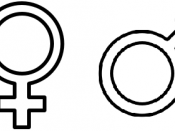In today's society, men are caught up in this traditional, poisonous perception of masculinity in which all men are created to be the superior gender with special power with privilege and are self-governing, unemotional, competitive, power oriented beasts. As women have been taking roles and forming groups to counter this stereotype and bring about in society a new face on women, some men have been taking new roles as well. When the feminist movements began to really take a hold of the people around the 60's and 70's, men interested in changing conceptions of gender roles would embrace these feminist groups and form their own male liberation movement. Many of the first creators of men's liberation in the early 1970's were psychologists. They wanted to help destroy the sex role stereotypes that regard "being a man" and "being a women" as separate states that must be achieved by proper behavior.
The male sex role is both oppressive to women and harmful to men. A man with a fuller concept of humanity realizes that all women and men are potentially strong and week and that these human characteristics are not directed solely to one sex. These men realized that their involvement and support for these women influenced images of themselves as the "real man."(Lindsey, pgs 242-243) (Sawyer, 1970, p.1)
These male liberation groups would have conferences on various points such as sexism, parenting, friendship, violence against women, and sexual orientation. These conferences would focus mainly on changing society's perception of men and women on personal and social views rather than trying to change society politically. This movement wanted to join with women to confront patriarchy. Patriarchy is a social system in which the father is the head of the family and men have authority over women and children. A family, community,


Men's Liberation
This reminds me very much of a topic I did in my Sociology class called "Male Marginality." Your essay is excellently done! It provides a tremendous amount of information.
2 out of 2 people found this comment useful.